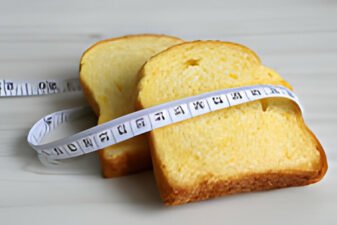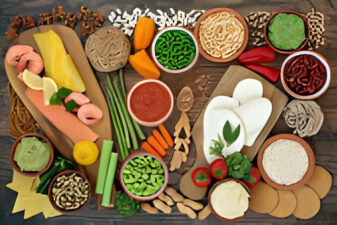Q. Does Eating Carbs Cause Weight Gain?
The answer is: No. Carbs do NOT make us overweight.
Carbohydrates are an important part of any healthy diet. Eaten regularly, carbs do NOT lead to weight gain, unless (like any food group) they are eaten to excess. After all, eating too much of anything and not burning it off through physical activity will lead to weight gain. That said, weight for weight, carbs provide fewer calories than fat or alcohol. It’s also what you add to the carbohydrates that bump up the calories. For example, the margarine or butter we put on the bread and the cream or cheese sauces we add to pasta. So if you need to lose weight, cut down on these added fats, NOT the carbs.
For a concise explanation of how ALL surplus calories (from fats, protein AND carbs) are converted to body fat and stored as adipose tissue, see How We Gain Body Fat?
Why Have Carbohydrates Become Such A Controversial Food?
To understand why carbs have attracted so much dietary criticism – much of it inaccurate and misleading – you need to understand a bit about the diet and food industry. The following explanation is a simplified account of the carb controversy.
Heart Disease And Low Fat Diets
In the 60s and 70s, cardiologists established a clear link between animal fats (in fatty meat, butter, cheese etc.) and coronary heart disease (hardening of the arteries or atherosclerosis). So low-fat diets became very popular. Unfortunately, in its attempt to cater for this preferred reduced-fat type of eating, the food industry started producing a huge range of low-fiber white flour food products (eg. muffins, donuts, bagels, cookies), tons of carb snackfoods (eg. multi-flavored popcorn, nachos etc.) and various high-carb add-ons and toppings. Note that ALL these foods are largely “refined” carbs – that is, carbs with most of the natural fiber removed. Thus, the low-fat approach led to a significant increase in the consumption of refined carbohydrate.
The Obesity Epidemic
During the 80s and 90s, obesity in North America grew almost out of control and many dietitians began to question whether the high-carb low-fat diet was contributing to this upsurge in overweight. Then clinical studies linked high consumption of refined carbs with metabolic problems (eg. blood-sugar problems, insulin resistance, type 2 diabetes), digestive disorders (diverticulitis and IBS) and heart disease. Dr Atkins then produced his extreme low-carb diet and claimed that carbohydrate was a major cause of obesity and overweight. This oversimplification – he refused to accept that unrefined whole grain carbs were a significant health food which had no negative effect on weight – caused a crazy fashion for carb-free foods. Not surprisingly, given the fact that most of the world outside North America has been eating carbohydrate for centuries without gaining weight, Dr Atkins dietary approach did not lead to a fall in obesity. Another carb-restricted diet, the South Beach Diet, followed Atkins, all carb-restricted diets are now viewed as outdated as a means of reducing weight among the population at large.
The GI Diet – How To Eat Good Carbs
Nowadays, most dietitians, nutritionists and obesity experts agree that good carbohydrate (eg. generally those types with a moderate or low GI value on the glycemic index) is essential for long term weight control and healthy nutrition. But it is still true that over-consumption of refined carbs (eg. generally white flour carbs with a high GI value) poses a serious risk of metabolic disorders including insulin insensitivity, type 2 diabetes as well as metabolic syndrome – all of which are closely associated with obesity. The point to remember is that NOT ALL CARBOHYDRATE IS BAD – only those foods which contain heavily refined/processed carbs. The GI diet does not discriminate on the basis of carb quantity. Instead it recommends we focus on carb-quality and eat lower-GI carbs.
Official Dietary Guidelines for Carbs
According to US Government Diet Guidelines, the World Health Organization and the World Cancer Research Fund, we should consume about 50-55 percent of our calories from carbohydrates.
Carbohydrates
Carbohydrates are essential to give us energy. They come in two forms:
- Starches (also called complex carbohydrates) – such as cereals, pulses and potatoes.
- Sugars found in fruit and vegetables (good carbs), and foods such as sweets, soft drinks and cakes.Note: Carbohydrate sugars in manufactured foods are refined sugars and should be limited. They contain far less fiber, nutrition and water than natural carb sugars in fruits and vegetables.
Sources of Good Dietary Carbohydrates
The following foods are all good sources of starches, but choose wholegrain, whole wheat, wholemeal, brown or high fiber varieties whenever possible.These ‘whole’ type of carbs still contain the whole grain, including the bran and the germ, so they’re higher in fiber and will keep you feeling fuller for longer – great if you’re trying to lose weight and hate feeling hungry. Examples include wholegrain rice, wholemeal bread, porridge oats, and wholewheat pasta. See also How We Digest Food.
- Bread
- Breakfast cereals
- Oats
- Pasta
- Noodles
- Rice
- Potatoes
- Sweet potatoes
- Beans
- Lentils
Carbohydrates and Fiber
Carbohydrate-rich foods like whole wheat bread, pasta and rice, pulses and some fruits are particularly rich in fiber, which helps to prevent constipation. The fiber in fruit, vegetables and pulses, can also help reduce blood cholesterol levels.
Carbohydrates in Fruit and Vegetables
Many (not all) carbs in fruit and vegetables are classed as sugars, but these are unrefined sugars and are quite different from the non-nutritious carb sugars found in manufactured, processed food. Fresh fruit and vegetables contain vital phyto-chemicals and other micro-nutrients that help protect us against serious diseases like heart disease and cancer. Aim to eat at least five portions of fruit and vegetables a day.
Carbohydrates to Avoid in Your Diet – The Bad Guys!
Unhealthy carbohydrates are the refined sugar carbs, found in foods like: cookies, sweets, cakes, carbonated soft drinks, ice-cream and syrups. The most refined of all sugars is table or icing sugar. Healthwise, we don’t need to eat any of these refined carbohydrate foods.
How to Choose Better Carbohydrates in Your Diet
To beat hunger pangs, lose weight and stay healthy, try these healthy carb tips:
- Substitute bran flakes for frosted flakes
- Substitute whole wheat bread for regular white bread
- Substitute rice cakes for cereal/granola bar
- Substitute wholegrain/whole wheat baguette for French bread
- Substitute wholewheat pasta for regular pasta
- Substitute brown rice for regular white rice
- Add wheatgerm and oats to your cereal
- Add chopped fruit to your cereal, salads and stews
- Serve beans, lentils and extra vegetables with your main meal
———————————————————————
Want to Lose Weight on a Low Carb Diet?
If so, our healthy Low Carb Diet is just ONE of the great diet plans in the AC Weight Loss Program
Carbohydrates and Glycemic Index (GI)
Everything you need to know about healthy carbohydrate, how much to eat and how the Glycemic Index helps to maintain good health and weight.
How the Body Uses Its Energy Sources
Guide to Carbohydrates
How Carbs Are Digested
How Carbohydrate Affects Blood Sugar
How Carbohydrate Affects Insulin
Health Risks of Excessive Insulin
Low Carb Eating Plans
More Details About GI
How GI is Measured
What Determines GI Value of Carb-Rich Foods
Guide to Glycemic Load
GI Values of Meals
How to Reduce GI Value of Meals
How Much Carbohydrate Do We Need in Our Diet
Guide to Carbohydrate in Our Diet
Which is Best: Low Carb or Low GI Diet
Health Benefits of Low GI Diets










